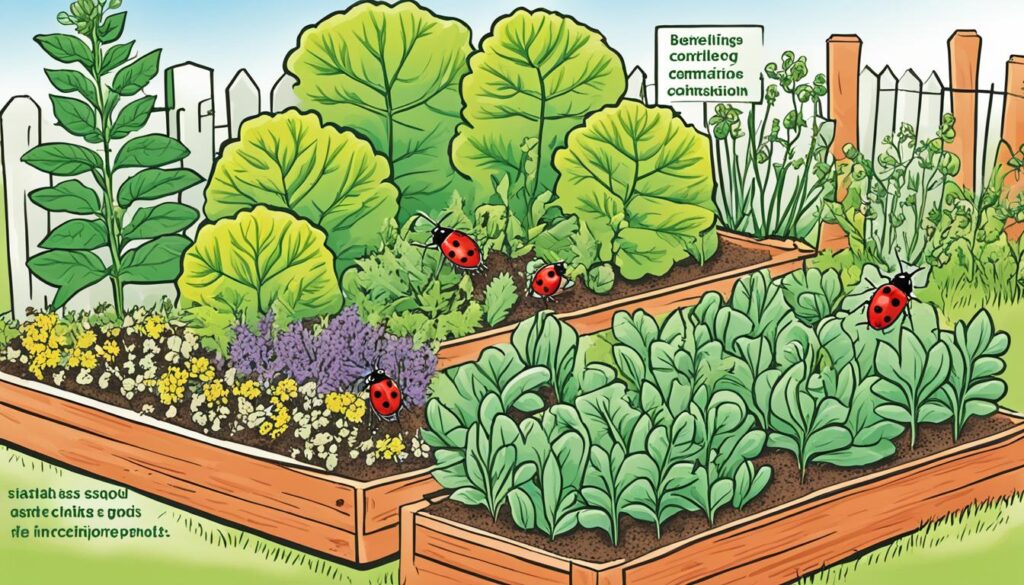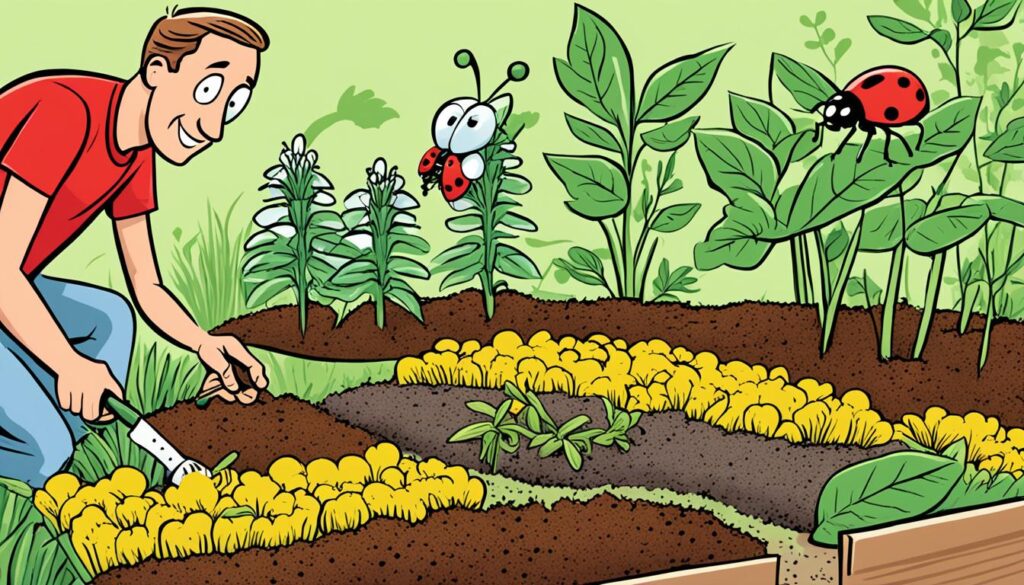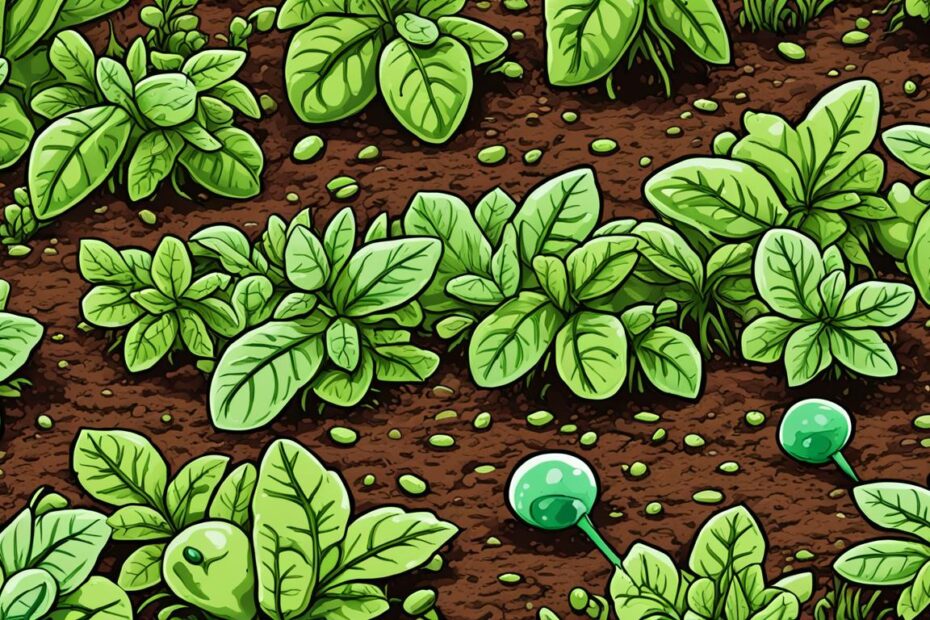Are aphids wreaking havoc in your garden, hindering plant growth and causing damage? Are you searching for effective solutions to eliminate these pesky insects from your soil? Look no further! In this comprehensive guide, we will equip you with the knowledge and strategies to combat aphids and create a thriving, aphid-free green space.
Key Takeaways:
- Understanding the impact of aphids on soil health is crucial for effective pest control.
- Natural methods, such as introducing beneficial insects and planting companion plants, can help eliminate aphids in soil.
- Implementing cultural practices, such as proper garden hygiene and plant care, can prevent aphid infestations.
- By taking proactive measures, you can protect your garden and enjoy a healthy, abundant harvest.
- Don’t let aphids dampen your green thumb – vanquish these unwanted pests and watch your garden flourish!
Understanding Aphids and their Impact on Soil Health
Aphids are small, sap-sucking insects that can infest plants and wreak havoc in your garden. They reproduce rapidly and can quickly overrun a plant if not dealt with promptly. These pests not only cause damage to plant foliage but can also have a negative impact on soil health. Aphids excrete honeydew, a sticky substance that can attract other pests, such as ants, and promote the growth of black sooty mold. This symbiotic relationship between aphids and other pests can create an unfavorable environment for plants to thrive. It is important to address aphid infestations to maintain healthy soil and plant growth.
To better understand the impact of aphids on soil health, it’s crucial to delve deeper into their relationship with other pests and how it affects the overall ecosystem of your garden. Aphids feed on the sap of plants, extracting vital nutrients. As they feed, they excrete honeydew, which can accumulate on leaves and in the soil. This sticky substance serves as a food source for ants, attracting them to the infested area.
Ants, in turn, protect the aphids from predators, ensuring a continuous supply of honeydew. This mutualistic relationship between aphids and ants can disrupt the natural balance in your garden and create an environment that is conducive to the growth of harmful organisms. One such organism is black sooty mold.
“Black sooty mold can flourish in the presence of honeydew excreted by aphids. It forms a dark, powdery coating on leaves, making them look dirty and unsightly. This mold not only hinders photosynthesis but can also impede the growth and development of plants.”
By understanding the impact of aphids on soil health, you can take proactive measures to protect your garden and promote a thriving ecosystem. It’s important to address aphid infestations promptly and effectively to prevent further damage and promote healthy soil and plant growth.
To illustrate the relationship between aphids, ants, and black sooty mold, refer to the table below:
| Aphids | Ants | Black Sooty Mold |
|---|---|---|
| Feed on plant sap | Attracted to honeydew excreted by aphids | Thrives in the presence of honeydew |
| Damage plant foliage | Protect aphids from predators | Hinders photosynthesis and plant growth |
| Negative impact on soil health | Disturbs the natural balance in the garden | Creates an unfavorable environment for plants |
Understanding the symbiotic relationship between aphids, ants, and black sooty mold is crucial in addressing aphid infestations and maintaining healthy soil and plant growth. In the next section, we will explore natural methods for controlling and eliminating aphids in soil.
Natural Methods for Controlling and Eliminating Aphids in Soil
When it comes to dealing with aphids in your soil, there are numerous natural methods at your disposal. These methods are not only effective but also safe for the environment and beneficial insects. Let’s explore some of the most effective natural methods for controlling and eliminating aphids in soil.
1. Beneficial Insects
One of the most effective natural ways to control aphids is by introducing beneficial insects into your garden. Ladybugs and lacewings are natural predators of aphids and can help keep their populations in check. By attracting these beneficial insects to your garden, you can create a natural and sustainable solution for aphid control. Their presence will ensure a healthy balance in your garden ecosystem.
2. Companion Plants
Another natural method to repel aphids is by planting companion plants that have natural aphid-repelling properties. Marigolds and garlic are excellent choices as they release compounds that repel aphids. Planting them alongside your susceptible plants can create a protective barrier against aphid attacks. This natural pest control method not only keeps aphids away but also adds beauty and variety to your garden.
3. Organic Insecticidal Soaps and Oils
If you need a quick and effective solution to eliminate aphids, organic insecticidal soaps and oils are an excellent option. Neem oil, for example, is a natural insecticide derived from the neem tree and is safe for plants and beneficial insects. These organic solutions work by suffocating the aphids and disrupting their feeding and reproductive cycles. Regular application of these soaps and oils can significantly reduce aphid populations without harming your plants or the environment.
4. Cultural Practices
In addition to using natural methods, implementing cultural practices in your garden can also help control and prevent aphid infestations. Proper garden hygiene, such as removing plant debris and weeds that can harbor aphids, is crucial. Regularly inspecting and manually removing infested leaves or plants can also prevent the spread of aphids. Furthermore, providing optimal growing conditions for your plants, such as adequate sunlight, proper watering, and balanced nutrition, can increase their resistance to aphids and promote overall health.
Tip: Remember, creating a diverse and balanced ecosystem is key to naturally controlling aphids in your soil. By combining multiple natural methods and adopting cultural practices, you can effectively eliminate aphids and maintain a healthy and thriving garden.

| Natural Methods for Controlling Aphids in Soil | Pros | Cons |
|---|---|---|
| Beneficial Insects | – Natural and sustainable solution – Balances garden ecosystem – Safe for plants and beneficial insects |
– Can take time to attract enough beneficial insects – Initial investment for purchasing beneficial insects (if required) |
| Companion Plants | – Natural repellent for aphids – Adds beauty and variety to the garden |
– Companion plants may not be as effective for heavy aphid infestations – Requires planning and careful selection of companion plants |
| Organic Insecticidal Soaps and Oils | – Quick and effective control – Safe for plants and beneficial insects – Environmentally friendly |
– May require repeated applications – Can have a strong odor – Some formulations may require caution when using around certain plants |
| Cultural Practices | – Promotes overall plant health – Prevents aphid infestations in the first place – Improves soil quality and garden aesthetics |
– Requires consistent effort and maintenance – May not be sufficient for severe aphid infestations |
Cultural Practices to Prevent Aphid Infestations in Soil
Implementing cultural practices in your garden can play a significant role in preventing aphid infestations in the soil. By adopting these practices, you can create an environment that discourages aphids and promotes healthy soil and plant growth. Here are some key cultural practices that can help you prevent aphid infestations:
-
Maintain Proper Garden Hygiene:
One important practice is to keep your garden clean by regularly removing plant debris and weeds. These can serve as hiding spots and breeding grounds for aphids and other pests, creating a favorable environment for infestations.
-
Inspect Plants and Take Proactive Measures:
Regularly inspect your plants for signs of aphids, such as curled leaves, distorted growth, or the presence of sticky honeydew. If you notice any infested plants or leaves, remove them immediately to prevent the spread of aphids to healthy plants.
-
Provide Optimal Growing Conditions:
Ensure that your plants receive adequate sunlight, proper watering, and a well-balanced nutrient supply. Healthy and strong plants are better equipped to resist aphid infestations. Consider using organic fertilizers to promote plant health without introducing harmful chemicals into the soil.
By incorporating these cultural practices into your gardening routine, you can create an inhospitable environment for aphids in your soil. This proactive approach not only helps prevent aphid infestations but also promotes the overall health of your garden.

“Cultivating a healthy garden starts with proper care and attention. By practicing good garden hygiene, inspecting plants regularly, and providing optimal growing conditions, you can prevent aphid infestations and nurture a thriving garden ecosystem.”
Conclusion
Now that you have gained a deeper understanding of the impact of aphids on soil health and effective strategies to control their population, it is time to take action and protect your garden. By implementing natural methods and cultural practices, you can eliminate aphids from your soil and create a thriving, pest-free green space.
Remember, the key to success lies in proactive measures. Start by introducing beneficial insects like ladybugs and lacewings, which will act as natural predators to keep aphid populations in check. Plant companion plants such as marigolds and garlic to repel aphids and create a hostile environment for them.
Additionally, maintain proper garden hygiene by removing plant debris and weeds that can harbor aphids. Regularly inspect your plants for signs of infestation and manually remove any affected leaves or plants. Providing plants with the right amount of sunlight, water, and nutrients will also strengthen their resilience against aphids.
By following these strategies, you can ensure a healthy and abundant harvest while keeping your plants and soil in optimal condition. So don’t wait any longer! Embrace these techniques to vanquish aphids from your soil and watch your garden flourish. Your green thumb will be rewarded with a thriving and pest-free oasis.
FAQ
Why are aphids harmful to soil health?
Aphids can excrete honeydew, a sticky substance that attracts pests and promotes the growth of black sooty mold, creating an unfavorable environment for plants to grow.
What are some natural methods for killing aphids in soil?
Natural methods include introducing beneficial insects like ladybugs and lacewings, planting companion plants that repel aphids, and using organic insecticidal soaps and oils.
How can cultural practices help prevent aphid infestations in soil?
Maintaining proper garden hygiene by removing plant debris and weeds, regularly inspecting plants for aphids, and providing plants with adequate sunlight, water, and nutrients can help prevent aphid infestations.
How can I protect my garden from aphids?
By understanding the impact of aphids on soil health, using natural methods for control, and implementing cultural practices, you can effectively eliminate aphids from your garden and create a thriving and pest-free green space.
